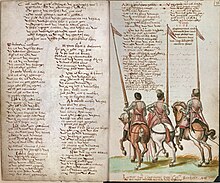Wilhelmus van Nassouwe
| English: William | |
|---|---|

Early version of the Wilhelmus as preserved in a manuscript from 1617
|
|
|
National anthem of |
|
| Lyrics | disputed, 1568 ~ 1572 |
| Music | adapted by Adrianus Valerius, composer of original unknown, 1568 |
| Adopted | 1932 (officially) 1954 (Netherlands Antilles) |
| Relinquished | 1964 (Netherlands Antilles) |
| Audio sample | |
|
Wilhelmus (instrumental)
|
|
Wilhelmus van Nassouwe, usually known just as the Wilhelmus (Dutch: Het Wilhelmus; pronounced [ɦɛt ʋɪlˈɦɛlmɵs]; English translation: the William), is the national anthem of the Kingdom of the Netherlands. It dates back to at least 1572, making it the oldest known national anthem in the world. The national anthem of Japan, Kimigayo, has the oldest lyrics, dating from the 9th century. However, a melody was added only in the late 19th century, making it a poem rather than an anthem for most of its lifespan. Although the Wilhelmus was not recognised as the official national anthem until 1932, it has always been popular with parts of the Dutch population and resurfaced on several occasions in the course of Dutch history before gaining its present status. It was also the anthem of the Netherlands Antilles from 1954 to 1964.
The Wilhelmus originated in the Dutch Revolt, the nation's struggle to achieve independence from the Spanish Empire. It tells of the Father of the Nation William of Orange who was stadholder in the Netherlands under the king of Spain. In the first person, as if quoting himself, William speaks to the Dutch people about both the revolt and his own, personal struggle: to be faithful to the king, without being unfaithful to his conscience: to serve God and the Dutch people. In the lyrics William compares himself with the biblical David who serves under the tyrannic king Saul. As the merciful David defeats the unjust Saul and is rewarded by God with the kingdom of Israel, so too William hopes to be rewarded a kingdom. Both the Wilhelmus and the Dutch Revolt should be seen in the light of the 16th century Reformation in Europe and the resulting prosecution of Protestants by the Spanish Inquisition in the Low Countries. Militant music proved very useful not only in lampooning Roman clerks and repressive monarchs but also in generating class transcending social cohesion.
...
Wikipedia
